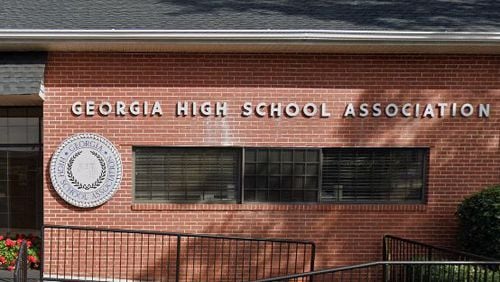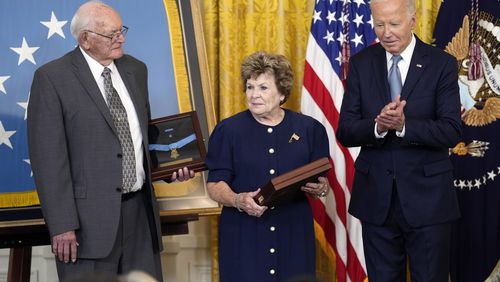The GHSA has bid adieu to executive director Robin Hines, who is retiring, and has hired Tim Scott to fill the shoes of one of the more progressive directors in the history of the organization.
Three high school coaches were asked to consider this question: If you were entering the Georgia High School Association as executive director, what would you focus on the second you walk in the door at the GHSA offices in Thomaston?
-Davis Russell, whose father Jay serves on the GHSA executive committee, has coached at Bremen since 2016. He has served on reclassification committees and the executive committee. He said his focus would be on reclassification. He thinks there should be a better way to handle it.
-Franklin DeLoach has spent nearly 25 years coaching baseball and softball at East Coweta. He won softball titles in 2017, 2018 and 2020. He thinks there’s an issue between higher-class public schools and city schools, and that would be his focus.
-Mike Muschamp has coached Lovett’s football program since 2005, leading the Lions to a state championship in 2013. His issue is with the abundance of transfers and the ease with which those transfers happen. He’d put an abrupt end to the transfer issue.
Here’s more from each coach. Answers have been edited for length and clarity.
Davis Russell, head football coach, Bremen
“I guess if I was the new guy at the GHSA, the first thing I would do is to ask advice on the state of GHSA athletics from people who have been in it a while ... from those who have seen the good, the bad and the ugly. And if those are the shoes you put me in, from my time on the executive committee and the reclassification committee, the No. 1 thing we need to do is find consistency within our reclassification process.”
“We do it every two years, and there’s so much change every reclass — schools moving way up in class or moving way down in class. Then we split the private and public, and now there’s power rankings in 3A and down. Every two years it seems like we are going in a completely different direction than the previous cycle.”
“Let’s go a few years without changing things drastically. Yes, in that time span there would be some need for a few changes so that teams are playing close to the same regions and the same natural rivalries. I think if we did that, there’d be less people up in arms and debating how all these changes are coming. That would be huge for me, consistency.”
Franklin DeLoach, head softball coach, East Coweta
“The city schools have quite an advantage, and the enrollment multiplier did a great job of getting those schools out of the lower classes. I think the GHSA should consider looking at the disadvantages of non-city schools in the upper classes.”
“I’d love for the GHSA to look at and have a little more parity between the non-city schools and the regular public schools. The GHSA has done a great job of looking out for the middle-to-lower classifications to make it an even playing field. But everything they’ve done for the last 10 years has been to help the smaller schools.”
“When they added the multiplier, all they did was push some of those private and city schools up to Class 7A, which is competitive enough as it is. I mean there are kids who could go to a certain county system school but will drive past that and maybe another school to go to the city school. Our world at East Coweta ... we are not in the same world as city schools like some of the other schools around the state.
“I’d like to see them do something for real public-school systems and athletics programs at the upper echelon, higher classes. They’ve done an absolute heck of a job in the lower classes.”
Mike Muschamp, head football coach, Lovett
“The biggest concern that I have is the number of transfers. We have gotten so far away from the idea of community with our schools and have gone to ‘win at all costs’ mentality. And then you’ve got multiple kids leaving a certain program and going to another program because of a coaching change.”
“We are educational establishments, so the idea is that we are developing our kids to handle adversity to embrace challenges. When they transfer, it seems to me, we are saying to them that it’s OK to not deal with adversity or challenges. I would increase the investigative arm of the GHSA, and if you want to transfer, they’re going to investigate it.
“Every single one. Right now, it seems they don’t really do much of anything, and it’s put up to the other school to do it. And there’s no GHSA person to investigate it to say there was a bona fide move in residence or no hardship faced in the move ... the kid just didn’t want to play here; he wanted to go play somewhere else.
“I just don’t understand how we’ve gotten to where we are right now. I view our job as football coaches, and any sport, we are supposed to take the kids who show up on July 22 and we are supposed to make the best team from that group. And just because my four-year starter graduated doesn’t mean I can go and get someone else’s quarterback.
“It’s my job to groom a kid or two or three in our system to get them ready for when the playing chance comes their way. There are an awful lot of schools that are trying to acquire talent the best they can. There are examples of a ‘hired gun’ transfer coming into a system and being ruled ineligible at one school but eligible at another.
“I just think we’ve lost our way from the traditional community and traditional school and the identity that goes with that school.”
About the Author







